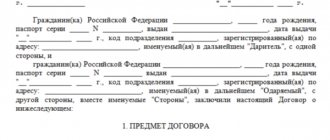Service apartments are provided to categories of workers and employees specifically specified in the legislation for the period of their employment relationship (janitors, district police officers, deputies, etc.).
Both service housing and dormitory are types of state or municipal specialized housing stock, premises in which are provided to citizens who do not have housing in the corresponding locality.
An employee can receive a service apartment in accordance with the nature of his employment relationship with the employer, and residential premises in a dormitory are provided regardless of the nature of the employment relationship.
Only an apartment or an individual house can be a service apartment, and the subject of a tenancy agreement in a hostel can be a room, or even part of a room with a living area of at least 6 square meters. m per person.
A dormitory is, first of all, a type of residential building specially adapted for the temporary residence of any employees of the employer.
For more information about what kind of housing is official, to whom it is provided and for how long, see our video.
2. Limitations of specialized housing status
As a general rule, residential premises for office purposes and in dormitories are not subject to privatization, exchange, sale or other alienation, because do not belong to the housing stock for social use.
But the law gives owners of service housing the right to transfer them to social rent and allow privatization.
And dormitory buildings transferred to municipal ownership automatically lose their dormitory status and social rental agreements with the right of privatization are concluded with all residents. Read more about this in our material “Conditions for recognition of housing rights.”
Also for your attention is a video consultation by Evgeniy Bobrov on how to privatize a service apartment or dorm room.
Who has the right to service housing?
According to the Housing Code of the Russian Federation, a service apartment is provided by state or local authorities, while a citizen and his family should not have their own living quarters in the region where he will work.
Question and answer Who should be paid extra for working at night and how much?
In accordance with Art. 93 of the Housing Code of the Russian Federation, service housing is provided only to those citizens who work:
— with government authorities;
— with local authorities;
- with state or municipal enterprises.
Service apartments are also available to persons who have been appointed to government positions in the Russian Federation or elected to elective positions. Providing corporate housing is practiced by some private organizations that have corporate housing.
Taxation of private enterprises
So, if a division of the company is a subsidiary enterprise, then the tax base for the activities of the enterprise must be formed separately from the tax base for other types of activities.
If profit is received from the activities of the private enterprise, there are no special features in its accounting. It increases the overall profit of the organization during the reporting (tax) period.
But more often than not, the activities of industrial enterprises are unprofitable. As is the case with “our” apartment. It does not bring any profit, since it is intended only for accommodation of business travelers.
And in order to recognize a loss received from an industrial enterprise, when calculating income tax, the special requirements of the Tax Code of the Russian Federation must be observed.
Having fulfilled all the conditions, the company has the opportunity to take into account the loss from the activities of the divisions of industrial enterprises when calculating income tax for the entire company as a whole. If at least one of the requirements is not met, then the loss received by the taxpayer from the use of private enterprise facilities can still be taken into account.
What type of job usually gives you a company apartment?
Which categories of citizens have the right to receive a service apartment are determined by federal laws and regulations of the constituent entities of the Russian Federation, as well as decisions and resolutions adopted at the local level. Accordingly, the categories of specialists who can receive an apartment for the duration of their work are determined at the regional level. “Official housing is given to those people who work in law enforcement agencies, are in military service, judges, and also partly to those who are state employees: teachers, doctors, etc. All of them are given temporary official housing,” said AiF.ru lawyer Oleg Sukhov . The amount of payment for the use of office space or rental fee is also set according to the tariffs and prices of the region.
In most cases, the right to official housing is granted to:
— teachers and doctors (housing is provided if specialists agree to go to work in a rural municipality);
— customs officials, judges, tax officials;
— workers in the housing and communal services sector;
— employees of the Ministry of Emergency Situations;
— law enforcement officers who are sent to serve in another city or town;
— civil servants (judges, officials, employees of ministries and departments, etc.);
— military personnel;
- deputies.
Question answer
Who is not entitled to redundancy payments?
Categories of citizens who can receive housing
In Art. 104 of the Housing Code of the Russian Federation states that the categories of citizens who have the right to apply for official housing are established in the housing stock of the Russian Federation or a constituent entity of the Russian Federation.
In particular, such citizens include the following categories of workers:
- Public school and hospital employees. For this category there is a list of certain conditions that they must fulfill in order to receive premises. In particular, this is their consent to work in rural areas. In this case, they can apply for housing at their place of work. For ordinary teachers or doctors, this opportunity is often not provided.
- Military personnel. This category of citizens is one of the most provided with official housing. At the same time, a single serviceman may be provided with a room in a dormitory, and if there is a family (especially if there is a need for frequent moves), a separate apartment is required.
- Law enforcement officers and the Ministry of Emergency Situations. One of the reasons for providing housing is the need for such workers to move frequently due to their work activities.
- Civil servants. In particular, this includes customs and tax workers, as well as judges. A special place is occupied by officials and deputies, who most often receive official housing. In this case, the apartment (or house) must be equipped with everything necessary, in particular, have a telephone. This is due to the importance of the functions performed by these employees, since they are part of the state’s management system.
- Representatives of the housing and communal services sector. In particular, this includes janitors, mechanics or electricians. The main purpose of this is to attract new employees.
Obviously, the provision of housing is an additional incentive for workers and is intended to increase the prestige of professions or jobs that are not particularly in demand among citizens.
For some other employees, this opportunity is rather a privilege for the importance of the functions they perform.
What is the procedure for obtaining official housing?
To obtain official housing, in addition to the application, you must provide several more documents: usually a copy of the passport, a copy of the work book, an extract from the Unified State Register of Real Estate (USRN), a copy of the marriage certificate (or divorce), a certificate of family composition, a copy of the employment agreement or contract (it must specify the period during which the employment relationship will be extended), as well as a petition or statement from the employer.
Service housing is allocated by decision of the authorities or the municipality. After such a decision is made, a rental agreement for office premises is concluded. According to the contract, the employee is obliged to pay regular fees for the use of the premises and pay for all utilities. In addition, the citizen must carry out current repairs at his own expense (major repairs are paid for by the owner of the premises).
Free housing when moving to the Far East
In recent years, the state has become concerned about supporting the Far Eastern region. Recent significant events in this region include:
- Construction of a bridge to Russky Island;
- Holding the APEC summit in Vladivostok and the WEF forum;
- Creation of a separate ministry for the development of the Far East;
- Launch and implementation of the Far Eastern Hectare program;
- A million allowances for migrants to the Far East.
All this shows that the Far East is critically important for Moscow and enormous amounts of money are spent on its development.
Housing for military personnel from the state - handing over the keys
We have previously written about government subsidies to migrants of 1 million for moving to the Far East. We also paid close attention to the Far Eastern Hectare program.
Which city should you move to? These cities are currently developing most dynamically:
- Vladivostok;
- Chita;
- Petropavlovsk-Kamchatsky;
- Yuzhno-Sakhalinsk;
- Blagoveshchensk;
- Khabarovsk;
- Ussuriysk
In the Far East, due to an acute shortage of specialists, higher salaries are paid; the average income of the same driver can reach 80-100 thousand rubles per month.
Is it possible to privatize a service apartment?
The possibility of privatization of official housing is provided for in Art. 4 of the Law of the Russian Federation dated July 4, 1991 No. 1541-1 “On the privatization of housing stock in the Russian Federation.” According to the law, a service apartment can be privatized if there is permission from the owner for privatization and a social tenancy agreement has been concluded for the apartment, which has lost its departmental status. That is, the decision to privatize office residential premises is the exclusive right of the owners. To privatize such housing, you must first remove the status of official housing from the apartment, and then conclude a social rental agreement in relation to it.
Question answer
How to rest at the employer's expense?
You can find out the status of real estate through a request to the owner of the property - the one who provided the living space. Also, the necessary information about the status can be obtained from the territorial body of Rosreestr. According to Article 8 of the Law of the Russian Federation “On the privatization of housing stock in the Russian Federation”, the decision on the issue of privatization of residential premises must be made based on applications from citizens within two months from the date of submission of documents.
Privatization of apartments from the Ministry of Defense in 2021
The Federal Law “On the Status of Military Personnel” dated May 27, 1998 No. 76-FZ contains guarantees for the provision of residential premises to military personnel. At the same time, there is still no normatively established procedure for the transfer of apartments into the ownership of military personnel by the Ministry of Defense. In practice, a conflict has arisen: on the one hand, military personnel have the right to privatization, for which they must contact the owner of the apartment (the extract from the Unified State Register for the apartment displays information about the form of ownership and the organization whose balance sheet the apartment is listed on), on the other hand, if the employer applies to the Ministry of Defense with an application for privatization, the Ministry of Defense cannot conclude an agreement on the transfer of ownership, since there is no mechanism for concluding such an agreement established by law; in other words, it is not clear who should sign on such an agreement and what formalities for making a decision on privatization must be complied with so that privatization is legal.
However, there is a way out - the serviceman (his family members) applies to the court for recognition of ownership rights through privatization and registration of ownership rights based on a court decision. At the same time, according to information posted on the official website of the Ministry of Defense, the Department of Property Relations of the Russian Ministry of Defense has begun to develop a package of regulations governing the procedure for transferring residential premises under the jurisdiction of the Ministry of Defense of the Russian Federation into the ownership of citizens (privatization of housing), which includes the Administrative Regulations for the provision of public services, the procedure for interaction between authorized military control bodies and organizations subordinate to the Ministry of Defense when carrying out legally significant actions on privatization. Until the completion of this work, the Department and its territorial departments are providing assistance in preparing the necessary set of documents for consideration of the issue of privatization in civil proceedings. Moreover, this news was posted quite a long time ago, so it is difficult to estimate the timing of the preparation of a regulatory act that will allow military personnel to privatize housing in the usual manner without trial.
In this article we will analyze the procedure for privatizing apartments of the Ministry of Defense by military personnel, including former military personnel and military pensioners, under a social tenancy agreement through the court, step by step. However, please note that before acting in accordance with these instructions, you need to order an extract from the Unified State Register of Real Estate for the apartment transferred under a social tenancy agreement (any person in Rosreestre or MFC can order it, since it contains publicly available information, you just need to pay a fee) . In this extract we check the form of ownership (state or municipal) and the copyright holder. If the apartment is in municipal ownership, then it must be privatized by contacting the administration of the local government. If the apartment is state-owned by a constituent entity of the Russian Federation (for example, Moscow), then it must be privatized through the authorized body of the constituent entity of the Russian Federation (in Moscow, for example, DGI). On the procedure for privatizing an apartment in the first and second cases, read a separate article at the link. If the apartment is listed on the balance sheet of the Ministry of Defense or its subordinate organizations, then to privatize the apartment for military personnel under a social tenancy agreement, follow the recommendations in these instructions.
Step-by-step instructions “How to privatize an apartment from the Ministry of Defense of the Russian Federation?”
Step 1. Identify the persons involved in the privatization of housing
Privatization is carried out into the common property of persons living in a residential premises or into the property of one person (including a minor) with the consent of all adults and minors aged 14 to 18 years who have the right to privatize this premises.
In this case, the refusal of a minor to participate in privatization can be carried out by his legal representatives only with the consent of the guardianship and trusteeship authority. Otherwise, minors who have (or have not lost) the right to use this premises are included in the agreement for the transfer of ownership of the residential premises (privatization agreement). Based on practice, we can say that it is virtually impossible to obtain the consent of the guardianship authority for privatization without the participation of a minor.
At the same time, residential premises in which exclusively minors under the age of 14 live are transferred to their ownership upon the application of parents (adoptive parents), guardians with the prior permission of the guardianship and trusteeship authorities or on the initiative of these authorities. Residential premises inhabited exclusively by minors aged 14 to 18 years are transferred to their ownership upon their application with the consent of parents (adoptive parents), trustees and guardianship authorities.
Persons who do not wish to participate in privatization must formalize a notarized refusal of privatization. Without a notarial refusal and the consent of all persons entitled to privatization, privatization of the apartment is impossible.
Thus, when you have decided who is participating in privatization, you need to issue notarial consents to privatization from those who participate in privatization, and notarial refusals of privatization from those who do not participate in privatization.
Step 2. Prepare the necessary documents for privatization
List of documents for privatization of an apartment for military personnel:
In many ways, the list of documents for privatization is similar to the list of documents that are submitted for concluding a social rental agreement to the Ministry of Defense. So, to register the privatization of an apartment for military personnel, you will need:
- application for privatization of an apartment from all those who did not refuse privatization
- copies of identification documents of persons specified in the social tenancy agreement and who have expressed a desire to participate in privatization (for those who have reached the age of 14 - a passport of a citizen of the Russian Federation)
- a copy of the birth certificate or a document confirming the birth and registration of the child, issued in the prescribed manner (in the case of the birth of a child on the territory of a foreign state) - for minor participants in privatization
- copy of the apartment card (extract from the house register)
- copy of an extract from the financial and personal account
- a copy of the social tenancy agreement (order, official tenancy agreement) with the acceptance certificate
- a copy of the decision of the housing commission (extract from the protocol) on the provision of residential premises (if available)
- extract from the Unified State Register for the apartment
- a copy of the power of attorney for the representative, if the representative is making the application
These documents are required to apply to the Housing Policy Department of the Ministry of Defense. Next, to go to court, you also need to collect the following documents:
- copy of service record
- extracts from the house register for the period from July 21, 1991 until arrival at this place of residence or a similar document replacing it
- a document from an authorized body confirming the unused right to participate in privatization at the previous place of residence, as well as a document confirming the authority of this body to issue the specified document. This document in Russia is provided by the BTI for the registration period from June 1991 to December 1997; for the period from January 1998, this document must be obtained from the Rosreestr Office for the region of residence.
- an extract from the personal file (certificate) indicating the period of service, family composition and reflection of registration at the military unit by periods of service (for officers, including those transferred to the reserve, and members of their families; citizens undergoing military service under a contract , and members of their families; citizens who are (were) provided with the use of official residential premises at a military unit for the period of the employment agreement (contract), and members of their families)
- written consent to the privatization of the occupied residential premises or a written refusal to privatize the occupied residential premises
Step 3. Submitting an application for privatization to the Housing Department of the Ministry of Defense
The application and copies of the documents listed above are sent to the Housing Department of the Ministry of Defense by Russian Post in a valuable letter with an inventory of the attachments; the inventory must indicate the list of documents being sent. The period for responding to the application is 30 days. It is better for the applicant to wait for a written response from the JO of the Ministry of Defense with a refusal to privatize due to the lack of authority to conclude agreements on the transfer of property. However, it must be taken into account that the Ministry of Defense may refuse for another reason. For example, due to the transfer of this apartment into the ownership of a municipality or a constituent entity of the Russian Federation, in this case the applicant needs to apply not to the court, but to the relevant body of the municipality or constituent entity of the Russian Federation for privatization (the link to the procedure for such privatization is posted above). Or the refusal may be due to the housing not meeting the criteria for apartments that can be privatized by law. In the latter case, it is necessary to understand the status of the apartment and develop an individual plan for resolving the dispute.
Step 4. Preparing an application and filing a lawsuit
After receiving a refusal from the Ministry of Defense, the serviceman files a claim for recognition of ownership rights in the court at the location of the real estate, attaches the documents indicated above in support of his claims, an application to the Ministry of Defense confirming its sending and the refusal of the Ministry of Defense to privatize. In addition, in order to recognize ownership rights through privatization in court, it is necessary to pay a state fee. A receipt for payment of the fee is attached to the statement of claim.
The state duty on claims for recognition of property rights through privatization must be paid in the amount of 300 rubles, since the subject of dispute in such claims are residential premises that are not subject to assessment upon free transfer into ownership (Resolution of the Plenum of the Supreme Court of the Russian Federation No. 8). If several persons participate in privatization, then each of them pays a fee of 300 rubles, since each of them makes a separate claim for recognition of a share in the ownership of an apartment in the manner of privatization.
Step 5: Take part in court hearings
To protect your right to free privatization and privatization of a military apartment from the Ministry of Defense through the court, you need to take part in court hearings to consider the claim and prove your case, if necessary, file a petition with the court to request missing documents to confirm your right to privatization, which you did not you have the opportunity to obtain it yourself (as a rule, difficulties arise with confirming non-participation in privatization, since military personnel often change the region of their place of service and are forced to obtain certificates from different regions; difficulties may also arise with the loss of some documents, loss of archival documents, etc. .).
Step 6. Obtain a court decision on housing privatization
After the court decision is made, the serviceman must wait for it to enter into legal force after the expiration of the one-month period for an appeal, if it has not been appealed. If an appeal is filed, the decision comes into force after the court considers the appeal, unless the appealed decision has been cancelled. If the decision of the court of first instance was canceled or changed and a new decision was made, it comes into force immediately.
Obtain from the court at least 2 certified copies of the court decision to register property rights (if there is more than one privatization participant, then you need to obtain the number of decisions according to the number of privatization participants + one for Rosreestr, you can get more copies of the court decision). The original of the decision is not issued, it is replaced by a certified copy (the original is made in one copy and is strictly stored in the case file in court).
Step 6. Register your ownership based on the court decision on the privatization of the apartment
The court's decision to satisfy your claim is the basis for registering the ownership of residential premises in Rosreestr.
To register ownership of an apartment, a serviceman must contact the Office of the Federal Service for State Registration, Cadastre and Cartography (Rosreestr), submitting 2 court-certified copies of the court decision recognizing ownership rights (or the number of privatization participants + one) in the privatization procedure and paying the state fee for registration of property rights. In Moscow and in many cities of the Moscow region, documents are submitted to the MFC.
For registration of ownership of an apartment through privatization, a state fee for individuals is charged - 2,000 rubles.
Upon completion of registration, Rosreestr issues an extract confirming the registration of ownership.
The Dvitex law firm provides assistance in the privatization of apartments from the Ministry of Defense of the Russian Federation by military personnel through the court (from collecting documents to registering property rights) with payment for services upon receipt of an extract from the Unified State Register of Real Estate certifying the registration of your property rights.
Do you need a privatization lawyer? To assess the prospects and calculate the cost of services, call us at 8 (495) 223-48-91 or submit a request.
Order
What kind of housing cannot be privatized?
Free privatization is allowed for state or municipal housing. As for the property of organizations, it cannot be privatized, but can only be acquired on the basis of a civil transaction.
“All official housing that was provided after 1991 cannot be privatized. Some housing can be purchased, but this right of purchase, as well as the conditions, price and terms are determined at the level of regional legislation. All these issues are resolved at the local level, not at the federal level. For example, in Moscow there is a decree that regulates the provision of official housing in the capital. If housing was provided as official housing before 1991, then almost any such housing can be privatized. The exception is housing provided by organizations that became private and to which such housing stock remained assigned and was not transferred to the municipality. If an organization privatized service housing in 1991 and kept it on its balance sheet, then such housing cannot be privatized. It is still impossible to privatize dormitories and housing located in closed military camps,” says Sukhov.
Providing housing for servicemen: legislation
The legislation of the Russian Federation provides for the provision of housing to all persons performing military service. According to Art. 15 of Federal Law No. 76-FZ “On the status of military personnel”, they are guaranteed a solution to the housing issue through the allocation of funds for the purchase/construction of a residential property or through the provision of residential premises for temporary use at the expense of the federal budget.
Moreover, this law allows for the possibility of serving apartments to military personnel subject to the following conditions:
- citizens must be recognized as needing housing on the grounds provided for in Art. 51 Housing Code of the Russian Federation;
- the total period of military service must be 20 years or more;
- upon dismissal due to health reasons or upon reaching the age limit for service, the minimum duration of duties is 10 years.
In these cases, the authorities provide military housing. It is transferred into ownership free of charge or through a social tenancy agreement.
Moreover, Decree of the Government of the Russian Federation No. 451 gives military personnel another special right - to receive housing upon extraordinary dismissal.
Thus, the privatization of official housing temporarily used by military personnel is possible. However, the property being registered must meet certain requirements:
- The living space meets the standards established by Art. 15.1 No. 76-FZ “On the status of military personnel”;
- the object is not located on the territory of the closed administrative unit;
- The Ministry of Defense of the Russian Federation does not have residential premises that can be transferred to a military man and his family in the order of priority as part of providing housing to those in need.
If all the stated conditions are met, then you can proceed directly to the privatization process. First, you will need to change the status of the premises, transferring it from a specialized service facility to municipal property.
To do this you need:
- Contact the owner of the premises with a request to change the status of the property.
In this case we are talking about the Ministry of Defense. You can contact the commander of the military unit by drawing up a report. There is no specially approved report form. The text clearly states their requirements, supporting them with references to legislation and attaching supporting documents. If the Ministry of Defense refuses, the conflict will be resolved through the courts. There you can appeal the department's decision. The plaintiff is given 3 months to appeal.
- Privatize the object.
After the housing has received municipal status and a social rental agreement has been concluded with the municipality, you can begin to privatize the apartment.
Housing for doctors under the “Zemsky Doctor” and “Rural Paramedic” programs
For doctors and physicians, there is a special program “Zemsky Doctor” to provide free government assistance in the amount of 1 million rubles for the purchase of an apartment. The state program is in effect in accordance with Federal Law No. 213.
We came up with and developed this program back in 2012, and since then more and more constituent entities of the Russian Federation have joined it. “Zemsky Doctor” is assistance from the state to doctors moving to the countryside. It helps healthcare professionals encourage relocation by offsetting the cost of purchasing a home.
Vacancies under the Zemstvo Doctor program
Condition for allocating 1 million rubles under the Zemsky Doctor program:
- Not older than 50 years;
- Conclusion of a 5-year contract with the local administration;
- Higher medical education.
The money is transferred within 30 days from the date of conclusion of the contract and signing of all necessary documents with the Ministry of Health of the Russian Federation. You also need to know that not all regions have taken part in this program yet.
Since 2021, the Zemsky Doctor program has been operating in these regions:
- Moscow region;
- Krasnodar region;
- Chechen Republic;
- The Republic of Dagestan;
- Leningrad region;
- Altai region;
- The Republic of Buryatia;
- Samara Region;
- Novosibirsk region;
- Republic of Crimea;
- Rostov region;
- Chelyabinsk region;
- Ulyanovsk region;
- Kaliningrad region;
- Kostroma region;
- Kursk region;
- Tula region;
- Kemerovo region;
- Magadan Region;
- Vologda Region;
- Ryazan Oblast;
- Nizhny Novgorod Region;
- Penza region;
- Tyumen region;
- Republic of Karelia;
- The Republic of Khakassia;
- Ivanovo region;
- Smolensk region;
- Irskut region;
- Tomsk region;
- Amur region;
- Republic of Adygea;
- Republic of North Ossetia - Alania;
- Republic of Bashkortostan;
- Perm region
- Khanty-Mansiysk Autonomous Okrug;
- The Republic of Dagestan;
- The Republic of Ingushetia;
- Tyva Republic;
- Karachay-Cherkess Republic










